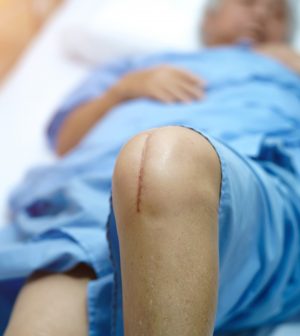- Could Your Grocery Store Meat Be Causing Recurring UTIs?
- Are You Making This Expensive Thermostat Error This Winter?
- Recognizing the Signs of Hypothyroidism
- 10 Strategies to Overcome Insomnia
- Could Artificial Sweeteners Be Aging the Brain Faster?
- Techniques for Soothing Your Nervous System
- Does the Water in Your House Smell Funny? Here’s Why
- Can a Daily Dose of Apple Cider Vinegar Actually Aid Weight Loss?
- 6 Health Beverages That Can Actually Spike Your Blood Sugar
- Treatment Options for Social Anxiety Disorder
Will Your Knee Replacement Need a Second Surgery?

Increasingly, knee replacement surgeries are requiring follow-up operations when post-op complications arise.
Now, new research from the University of Texas Southwestern is illuminating whether you might fall into a high-risk category for these second surgeries.
According to the researchers, the rate at which U.S. patients who underwent total knee replacement required follow-up surgery is expected to rise by up to 182% by 2030.
Investigators looked at a major database containing the medical records of almost a million patients who underwent knee replacements between 2006 and 2015.
About 3.5% of those surgeries required a second “revision” surgery, the Texas team found.
Right now, “revision rates are relatively low overall, but further research is needed into additional risk factor interactions due to the significant physical, psychological and financial toll of revision surgery,” study lead author Dr. Georges Bounajem said in a university news release.
The number one risk factor for a revision surgery: Age. Younger patients were more prone to requiring a second surgery, Bounajem’s group found.
Other demographic factors were also key, including sex (men were more prone to a second surgery than women); race (Black patients required follow-up more than whites); and location (big city patients were less prone to second surgeries than folks living in smaller centers).
A three-day hospital stay after a total knee replacement seemed ideal: Patients with hospital stays that were shorter or longer than three days also faced a higher risk for a second knee procedure, the study found.
Also, the reason for the knee replacement seemed to matter. The majority of these operations occur because of progressive osteoarthritis of the knee. People who had their knees replaced for other reasons (arthritis linked to injury, a tumor or a condition called osteonecrosis) had higher risks for a needing follow-up operation, the researchers said.
The findings were published in the Archives of Orthopaedic and Trauma Surgery.
“This research helps to identify risk factors for revision surgery so patients can be better counseled on expectations with their knee replacements. It also helps surgeons identify which patients may be good candidates for surgery,” said Bounajem, a professor of orthopedic surgery at UT Southwestern.
SOURCE: UT Southwestern, news release, Feb. 21, 2024
What This Means for You:
A minority of folks undergoing knee replacement will require follow-up surgery due to complications, and certain factors increase the risk.
Source: HealthDay
Copyright © 2026 HealthDay. All rights reserved.










